34th Manipuri Language Day Celebrated Amid Calls for Preservation and Classical Status
ART & CULTURE
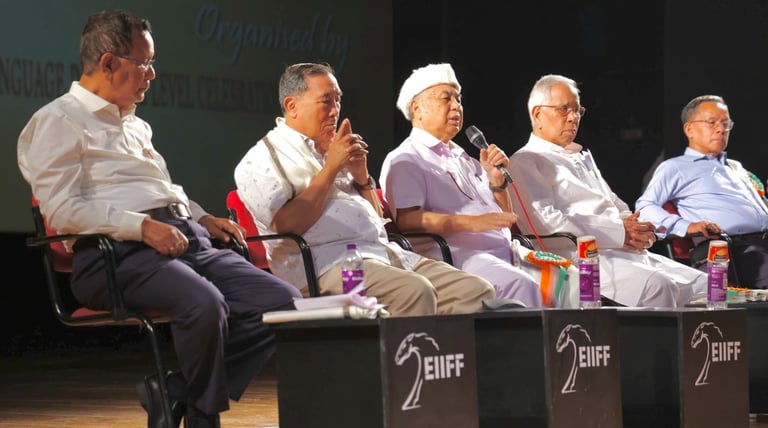

Imphal: The 34th Manipuri Language Day was celebrated on August 20, 2025, at the MSFDS Auditorium, Palace Compound, Imphal, marking the inclusion of the Manipuri language (Meiteilon) in the Eighth Schedule of the Indian Constitution on August 20, 1992. Organized by the Manipuri Language Day State Level Celebration Committee in collaboration with the Department of Art & Culture and the Directorate of Language Planning and Implementation, Manipur, the event highlighted the cultural significance of Meiteilon, the ongoing struggle for its recognition as a Classical Language, and concerns over its endangered status.
Image: Dignitaries seated on the dais during the 34th Manipuri Language Day Celebration
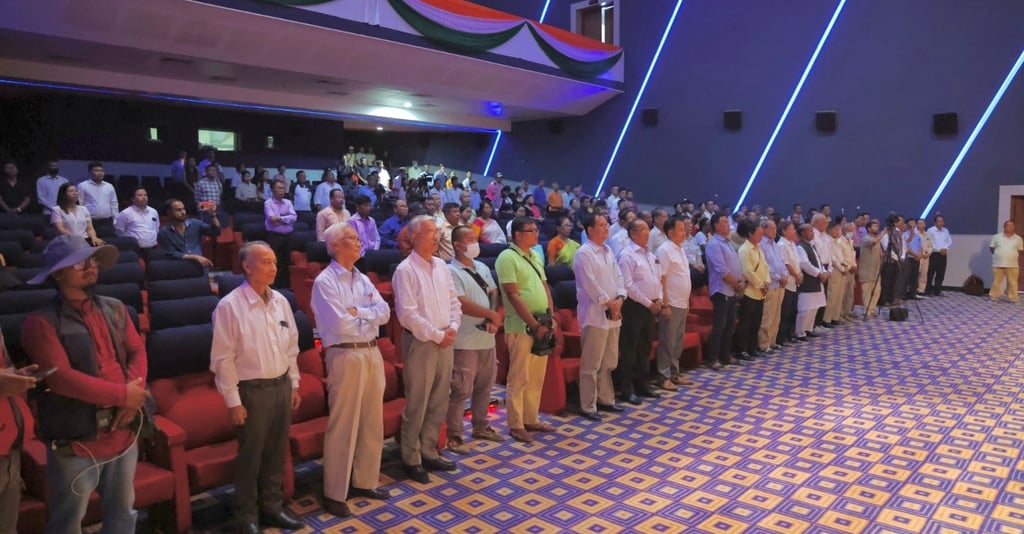

Image: A view of the audience at the MSFDS Hall during the event
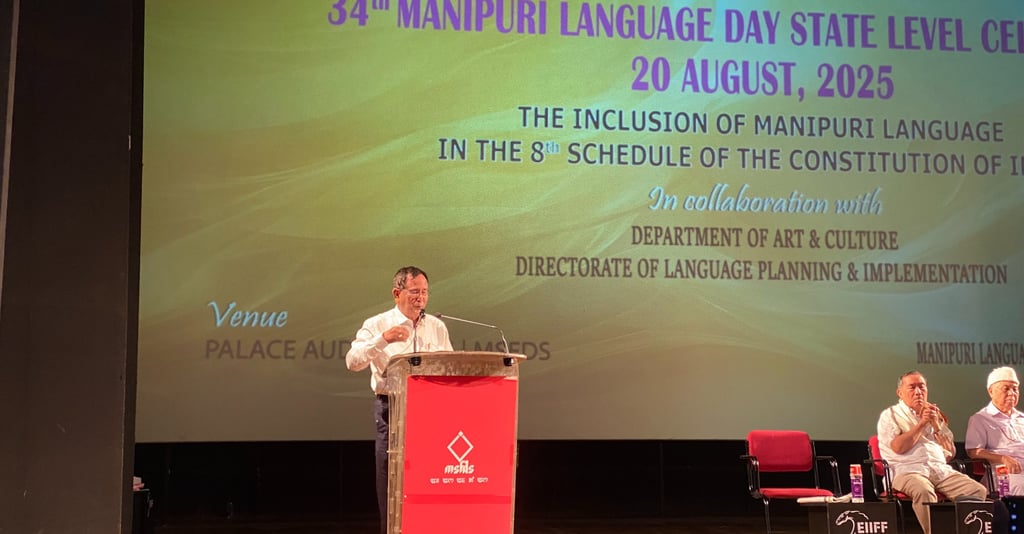

Image: Former Union Minister Dr. R.K. Ranjan delivers his speech during the event
A Celebration Tinged with Concern
The event featured prominent speakers, including Prof. W. Nabakumar Singh and Prof. Yashawanta Singh, both retired professors from Manipur University, who emphasized the deteriorating state of Meiteilon. They underscored the intrinsic link between language and culture, warning that the decline of Meiteilon threatens the cultural fabric of Manipur. The speakers urged collective action to reverse this trend, pointing to the growing preference among locals for English and Hindi, particularly in education, where English-medium schools are increasingly favored.
Dr. Th. Meinya Singh, former Member of Lok Sabha, highlighted Meiteilon’s role as the lingua franca of Manipur, a state with diverse communities and dialects. He stressed the need for a robust institutional framework to preserve indigenous languages, proposing that the Directorate of Language be shifted from the Department of Education to the Ministry of Home to strengthen preservation efforts. Dr. Meinya also called for a comprehensive language policy, noting that states like Tamil Nadu and Karnataka have successfully implemented such frameworks. He reiterated the long-standing demand for Meiteilon’s recognition as a Classical Language, a status already granted to languages like Nepali and Konkani.
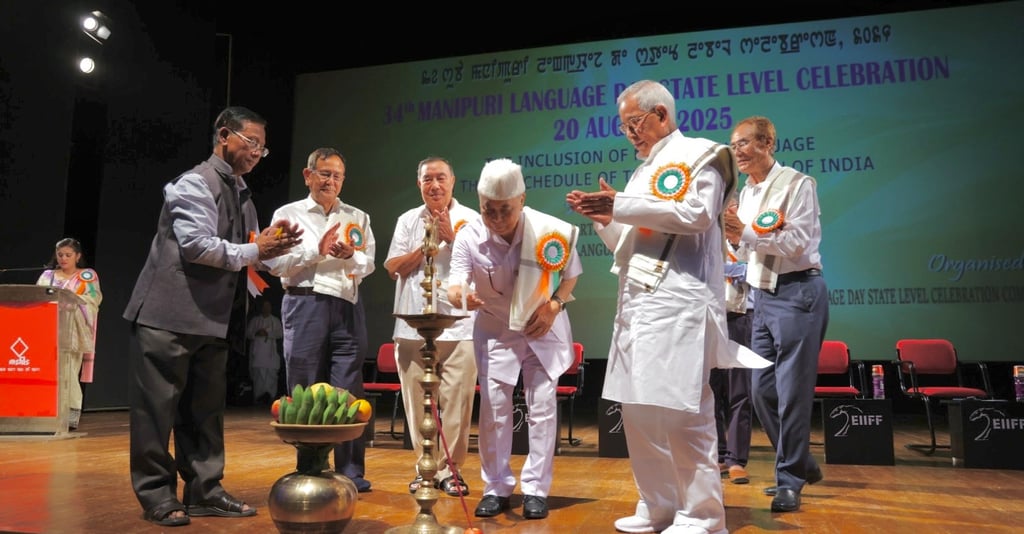

Image: Dignitaries lighting the ceremonial lamp
Dr. R.K. Ranjan, former Union Minister of State for Education & External Affairs, paid tribute to the language activists whose struggles led to Meiteilon’s inclusion in the Eighth Schedule. He emphasized that Meiteilon meets the criteria for Classical Language status, citing its documented history of 1,500–2,000 years. However, he expressed alarm over its classification as an endangered language by UNESCO, attributing this to the declining use of Meiteilon in daily communication and education. Dr. Ranjan urged Manipuris to take pride in their mother tongue and pledge to speak it across borders, reinforcing its cultural and linguistic significance.
Prof. Meijinlung Kamson, former Union Minister of State for Home Affairs and Chairman of the Celebration Committee, highlighted Meiteilon’s richness as evident in its literature, including books and novels. He emphasized its role as a unifying force among Manipur’s diverse communities, stating, “When one speaks the same language, there will be peace, love, and unity.” Prof. Kamson called for expanding Meiteilon’s use as a lingua franca to foster harmony in the state.
The Struggle for Eighth Schedule Inclusion
The inclusion of Meiteilon in the Eighth Schedule in 1992 was a hard-fought victory for Manipuri language activists. The movement, spanning decades, involved protests, advocacy, and negotiations with the central government to recognize Meiteilon as one of India’s official languages. This milestone granted Meiteilon constitutional recognition, enabling its use in education, administration, and official communication. However, the journey did not end there. The demand for Classical Language status, which would provide additional resources and prestige, remains unfulfilled. Unlike Tamil, Sanskrit, or Konkani, Meiteilon has yet to be recognized as a Classical Language, despite its ancient literary tradition and historical significance.
Endangered Status and Linguistic Shift
UNESCO’s classification of Meiteilon as an endangered language has raised alarm bells in Manipur. The language faces challenges from the growing dominance of English and Hindi, particularly among the younger generation. English-medium schools are increasingly preferred, driven by the perception that fluency in English ensures better economic and social opportunities. Hindi, as a link language, is also gaining traction, especially in urban areas. This linguistic shift has led to a decline in the use of Meiteilon in everyday communication, threatening its vitality.
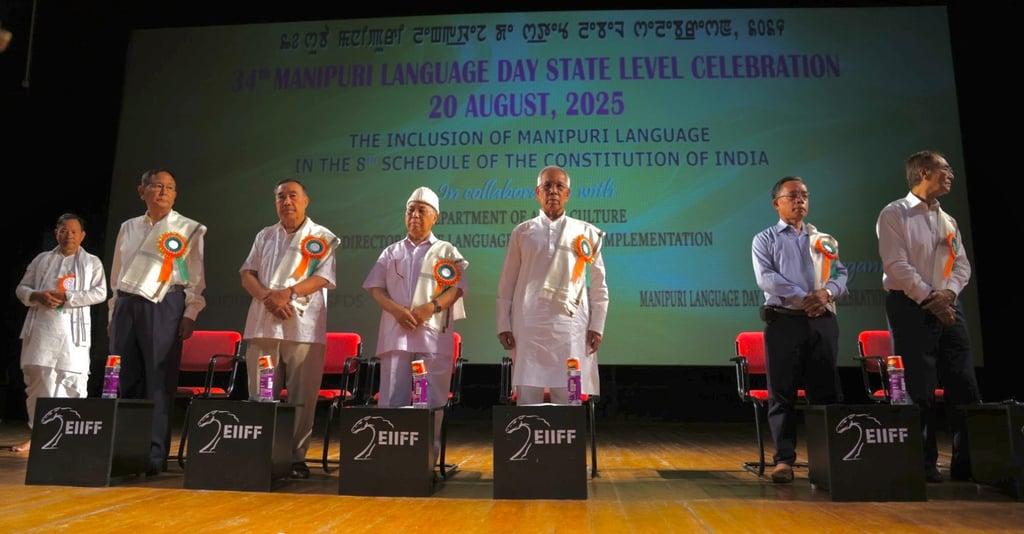

A 2023 study by the Directorate of Language Planning and Implementation noted that only 60% of Manipuri youth regularly use Meiteilon at home, with many opting for English or Hindi in public and educational settings. The rise of digital media and globalization has further accelerated this trend, as younger generations gravitate toward languages perceived as more “modern” or “global.”
Calls for Action
The 34th Manipuri Language Day underscored the urgency of revitalizing Meiteilon. Speakers called for:
1. Classical Language Status: Greater advocacy to secure Meiteilon’s recognition as a Classical Language, which would unlock funding for preservation and research.
2. Language Policy: A state-level language policy to promote Meiteilon in education, media, and administration.
3. Community Engagement: Encouraging families and institutions to prioritize Meiteilon in daily communication and cultural activities.
4. Institutional Reforms: Strengthening the Directorate of Language Planning and Implementation with greater autonomy and resources
A Collective Responsibility
The event, attended by dignitaries like Dr. M. Nara Singh, former Minister of Art & Culture, and Leihaothabam Saratchandra, Convenor of the Celebration Committee, along with representatives from 17 organizations, reflected a shared commitment to preserving Meiteilon. The celebration served as both a tribute to past struggles and a clarion call to address the language’s precarious future.
As Manipur navigates its linguistic and cultural challenges, the 34th Manipuri Language Day highlighted the need for collective action to ensure that Meiteilon remains a vibrant symbol of the state’s identity. Without concerted efforts, the language risks fading into obscurity, taking with it a rich heritage that has unified Manipur’s diverse communities for centuries
